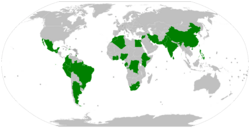Group of 24 facts for kids
 |
|

Members of the Group of 24 as of 2019
|
|
| Abbreviation | G-24 |
|---|---|
| Named after | Number of founding Member States |
| Formation | 1971 |
| Founder | Group of 77 |
| Founded at | Lima, Peru |
| Type | Intergovernmental trade bloc |
| Purpose | To aid in the coordination of the positions of developing countries on monetary and development issues |
| Headquarters | Washington, D.C., United States |
| Methods | Collective bargaining, lobbying, reports and studies |
| Fields | International trade |
|
Membership (2019)
|
29 Member States |
|
Chair of the G-24
|
Adama Coulibaly (Adama Coulibaly in French) |
|
Parent organization
|
Group of 77 |
| Affiliations | United Nations |
| Website | www.g24.org |
The Group of 24 (G-24) is a special group of countries. It was started in 1971 by the Group of 77. Its main goal is to help developing countries work together. They want to make sure their ideas are heard. This is especially true when talking about global money matters and how countries grow.
The group was first named after its 24 founding members. Today, it has 28 member countries. China also joins their discussions as a special guest. Any country from the G-77 group can join in their talks.
The G-24 is not officially part of the International Monetary Fund (IMF). However, the IMF helps the G-24 with its office work. The group meets twice a year. These meetings happen before big meetings of the IMF and the World Bank. This allows developing countries to talk about important topics first.
Contents
Member Countries
The G-24 includes countries from different parts of the world. Here are the member countries:
African Countries
Latin American and Caribbean Countries
Asian Countries
Observer Countries
Some countries watch the G-24 meetings without being full members. They are called observers:
Observer Organizations
Several international groups also observe the G-24:
- Arab Monetary Fund
- Economic Commission for Latin America and the Caribbean
- Group of 77
- International Labour Organization
- Islamic Development Bank
- OPEC Fund for International Development
- Organization of the Petroleum Exporting Countries
- South Centre
- United Nations Conference on Trade and Development
- United Nations Department of Economic and Social Affairs
- Central American Monetary Council
How the G-24 Works
The G-24 works in two main ways. One way is at the political level. This involves important leaders like Ministers. The other way is at an operational level. This is handled by the G-24 Liaison Office.
The main leaders of the G-24 meet twice a year. These meetings happen before the big meetings of the IMF and the World Bank Group. Leaders from the IMF and World Bank often speak at these G-24 meetings.
Before the main meeting, officials called "Deputies" discuss the issues. Then, the Ministers approve a document. This document shares the common ideas of all member countries. This document is then shared with the public. All decisions in the G-24 are made by everyone agreeing.
Who Leads the G-24
Current Leaders
The G-24 has a team of leaders:
- Chair: Adama Coulibaly, who is the Minister of Finance for Côte d'Ivoire.
- First Vice-Chair: Benjamin E. Diokno, the Secretary of Finance for the Philippines.
- Second Vice-Chair: Sergio Massa, the Minister of Treasury for Argentina.
The Secretariat
The G-24 Secretariat is like the main office for the group. It is located in Washington D.C., at the IMF Headquarters. The Secretariat helps G-24 members talk to each other. It also helps them agree on important topics. They also manage the group's work and support the Chair.
The Secretariat is led by a Director. Since 1997, the Director also manages the G-24's research work.
Here are some of the past and current Directors:
| Year | Name | Country |
|---|---|---|
| 1997 | Aziz Ali Mohammed | |
| 2000–2002 | William Larralde | |
| 2002–2007 | Ariel Buira | |
| 2007–2014 | Amar Bhattacharya | |
| 2014–2023 | Marilou Uy | |
| 2023–present | Iyabo Masha |
Past Chairs
The G-24 has had many different countries lead as Chair over the years. The Chair changes regularly.
| Year | Chair |
|---|---|
| 2005 | |
| 2006 | |
| 2007 | |
| 2008 | |
| 2009 | |
| 2010 | |
| 2011 | |
| 2012 | |
| 2013 | |
| 2014 | |
| 2015 | |
| 2016 | |
| 2017 | |
| 2018 | |
| 2019 | |
| 2020 | |
| 2021 | |
| 2022 | |
| 2023 |
Research and Studies
The G-24 also does a lot of research. This research focuses on topics important to developing countries. They look at things like the global economy and how countries can grow. They also study how international money systems work. Another key area is how to get money for development projects.
Their research covers many topics. These include how economies change, trade, and new technologies. They also look at how to make global financial groups fairer. They study how money moves between countries and how to manage debt. You can find many of their studies and reports on their website.
See also
 In Spanish: G24 para niños
In Spanish: G24 para niños
 | Calvin Brent |
 | Walter T. Bailey |
 | Martha Cassell Thompson |
 | Alberta Jeannette Cassell |

